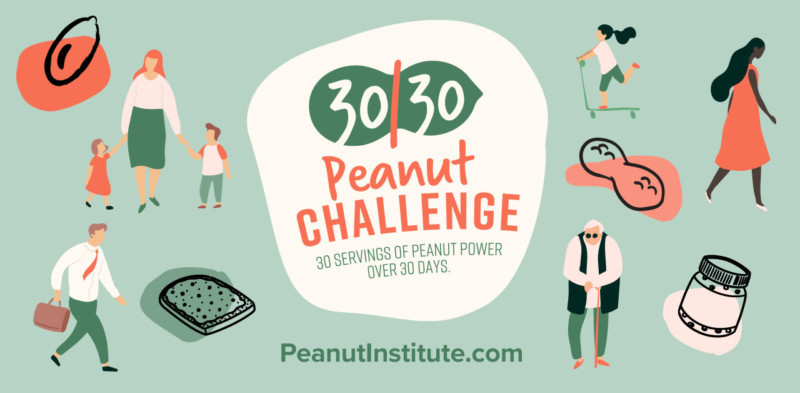
Peanuts have it all. They’re tasty, low-cost and packed with protein, vitamins and minerals. To celebrate this superfood, The Peanut Institute is launching a 30/30 Peanut Challenge. For 30 days, Americans are encouraged to incorporate 30 peanuts or two tablespoons of peanut butter into their daily diet.
Dr. Samara Sterling, director of research for The Peanut Institute and also known as Dr. Peanut, cites peanuts’ significant health benefits as the reason for the challenge.
“Studies in the United States and around the world have found that eating peanuts regularly has been associated with a reduced risk of cancer, heart disease and diabetes. Peanut consumption has also been shown to deliver positive effects throughout the entire body and improve overall life expectancy,” explains Sterling.
Peanuts are also extremely budget friendly. Two servings of peanuts cost less than 30 cents and deliver 14 grams of power-packed plant protein.
Other benefits of consuming peanuts and peanut butter include:
- Eating peanuts regularly can reduce the risk of developing cardiovascular disease by 30%.
- Peanuts have 30% more protein per one-ounce serving than cashews, hazelnuts and walnuts.
- A serving of peanuts contains almost 30% of daily niacin needs. Niacin can reduce the risk of developing Alzheimer’s disease by 70%.
- Resveratrol, a bioactive found in peanuts, is believed to improve blood flow to the brain by as much as 30%, which helps reduce the risk of stroke.
- Short-term memory, which lasts up to 30 seconds, can be improved by eating peanuts.
- For the 30 million people in the U.S. who are living with Type 2 diabetes, peanuts provide a low-cost option to keep blood glucose under control.
- The entire human gastrointestinal tract is about 30 feet long. Peanuts are a good source of fiber, which promotes satiety and proper digestion. Fiber also helps keep the intestines healthy.
- During an average lifetime, the heart can beat more than 3 billion times. Peanuts contain arginine and other compounds, which help improve heart health and keep it beating.
- Doctors recommend 30 minutes of daily exercise for everyone. Peanuts and peanut butter deliver plenty of energy to get it done, making them a favorite of fitness enthusiasts around the world.
- For those who have 30 minutes (or less) for breakfast, studies show that including peanut butter can help create satiety even 8-12 hours later.
The 30/30 Peanut Challenge is easy to adopt since peanuts and peanut butter are extremely versatile and can be incorporated into breakfast, lunch, dinner and snack time. (In fact, they’re so versatile that George Washington Carver developed approximately 300 uses for peanuts, including peanut butter, flour, shaving cream, soap and skin lotion.)
For those looking to integrate peanuts into their daily meals, a peanut butter smoothie can start off the day. A peanut Cobb salad is great for lunch. A warm and hearty peanut soup or stew is ideal for a fall dinner. And, to power through the afternoon, a handful of peanuts do the trick.
“We’re encouraging everyone to join the challenge and share your experience on our social channels, #peanutchallenge,” says Sterling. “Of course, I’m going to participate so you’ll get to see how I make peanuts part of my day.”
As part of the 30/30 Peanut Challenge, The Peanut Institute is giving away 30 peanut-powered gift baskets throughout November.
For more information on peanut recipes and the peanut-powered gift basket giveaway, visit peanutinstitute.com.




